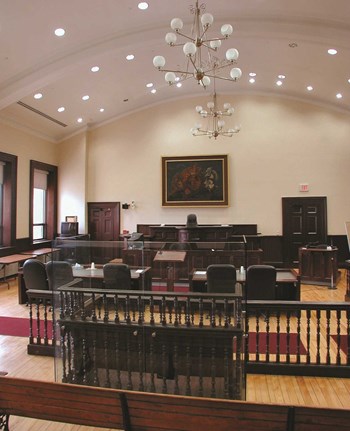
Lawsuits are usually not an association’s go-to method for dispute resolution. Expensive and time-consuming, they can quickly turn into a financial burden and may create strained relations in the community. Unfortunately, in some cases there’s no other way out. Last year a couple filed a suit against a neighbor, the association, individual board members, and property managers who all neglected to respond to the couple’s complaint of odors infiltrating their unit, the result of 20 cats inhabiting the neighbor’s unit below.
This may have been an extreme case but most associations will be involved in a lawsuit at some point, though the length and certainly, price tag may vary. “The variables are how complicated are the causes of action. I could file a simple complaint but if the defendant hires an attorney and cross claims, it could get very complicated. It depends on how much discovery is necessary, depends on how much motion work, if it goes to trial. It's impossible to predict, really,” says Anne Ward, an attorney at the law firm of Ehrlich, Petriello, Gudin & Plaza in Newark, New Jersey.
Regardless of the cost or type of complaint, there are a few basic points about lawsuits that all associations should be aware of.
The Basics
Unless you live in a utopian condo association, lawsuits are bound to happen. The most common ones include noise complaints between neighbors, construction defects in units and attempts to collect delinquent payments from residents. Boards should know what to do if they're the target of litigation. “The first step when a board is sued is they should first immediately reach out to their attorney,” says Eric Goidel, a partner at the Manhattan-based law firm of Borah, Goldstein, Altschuler, Nahins & Goidel in Manhattan. “The attorney should reach out to the insurance broker because all co-ops and condominiums should have general liability insurance and that will cover you for things like personal injury and property damage issues, and almost all boards have directors and officers liability, which will cover the actions of the board taken over the course of representing the interests of the co-op or condo,” says Goidel.
In the case of maintenance fees, boards have to be strategic in going on the offensive. “The board has to decide whether they want to take legal action against that delinquent unit owner. Under the Fair Debt Collection Practices Act, the attorney or any debt collector is required to send a demand letter, that says how much is owed, who the creditor is, and they have 30 days to dispute that amount,” says Ward. “If the debt has not been paid by the 30th day, the association files a complaint. If it's less than $15,000, and it typically is, I usually file it in the special civil court as opposed to the criminal court. The process is easier and quicker. It's very limited discovery, so you get a quick decision,” says Ward.
Surprisingly, most cases are settled before the completion of a trial, says Ward. “I have filed complaints and it costs a few hundred dollars, and it settles immediately, and have also filed complaints and they've taken on a life of their own, and you know, $30,000 later.”
Don’t Go At It Alone
That said, legal experts cannot recount how many times residents, property managers or even entire boards have tried to immediately resolve the dispute themselves, ultimately creating more legal challenges. A trap that associations find themselves in is selective enforcement. “One thing I would say is board members should not do-it-yourself. That's where they get into trouble. That's where you wind up getting into trouble. Depending upon who the board members communicate with, there are attorney/client privileges that might be lost if you try to do it yourself,” says Goidel.
Any lawsuit is public record, so parties involved in a lawsuit don't have to worry about invasion of privacy, but boards especially should be careful about how they discuss lawsuits. “If the co-op allows open meetings, at no time should litigation be discussed at that portion of the meeting. If the board wants to discuss it they should go to executive session but even then it should just be the basics on where they stand, not about the facts or legal strategy, that should really be done in consultation with the attorney or insurance attorney,” says Goidel.
Although lawsuits can take a toll on pocketbooks, associations or boards may be covered by their general liability insurance or Directors & Officers coverage, respectively. “There's an important distinction between general liability insurance and directors and officers’ liability insurance, and that is the direct notice to the carrier,” says Goidel. “For example, if someone slips and falls on your property. If you're aware, you should put your carrier on notice but actually you're not obligated to notify your carrier until you're actually sued. If you didn't notify them when it happened or you weren't aware of it, you're not obligated to notify them until you get sued. In a director and officers’ liability, you're required to notify the carrier at the earliest point where you reasonably believed a claim might exist.”
In the first phases of a lawsuit, the involvement of the association attorney is crucial in steering the board or association toward a lawful and appropriate path to resolution.
Let’s Talk Money
Lawsuits are no cheap matter, that’s a given. However, predicting the cost of a suit is difficult. “It depends on the situation. Does the board want to be sued, can they settle it, are the unit owners nice? A lot of it just really depends on the circumstances,” says David J. Byrne, a partner at the law firm of Herrick, Feinstein LLP with offices in Manhattan and New Jersey. “The variables would [include] the experience of the lawyer. Although their hourly rate might be higher, it might ultimately be cheaper because the lawyer doesn't have to learn a lot of things on the fly. Depends on the diligence of the board and the management company. If the board or management is lazy, they would force the lawyer to do more work. Whether the lawsuit requires a lot of deposition or disclosure, if the facts are in dispute, or if the issue can be resolved quickly,” says Byrne.
Any Alternatives?
Lawsuits that spiral into expensive and damaging affairs don't happen overnight. In New Jersey, for example, “Before an association can file a complaint for what's called a housing-related dispute, they’re supposed to offer them ADR,” says Ward. “As far as I'm concerned the courts are still dealing with this, it doesn't apply to their obligation to pay maintenance fees. There's no way to dispute that, the law is just that you have to pay. But let's say the board says, there's a dog in a unit, they think ADR would be required before you go to litigation, and that's probably a good common sense way to do it anyway.”
Parties can meet on their own, even without the presence of an attorney, but recently many residents and associations seek the guidance of mediation experts, who serve as a kind of neutral buffer and offer constructive methods to reaching compromise. But if that doesn't work, other methods of resolution are available. “Arbitration, which is legally binding is also a possibility to avoid some of the drama of litigation. “Arbitration is quicker, and a little less costly than litigation, and you get arbitrators who probably have some experience in the field, as opposed to a judge who just has experience in the law, and has to learn about the field,” says Goidel. “Once the arbitrators decide, it's binding, and there's no right to appeal. We make the boards understand, 'This is it. This is your bite of the apple. If you win, you win. If you lose. you lose.'”
Downside of Constant Litigation
The occasional lawsuit will not cripple an association but a long history of litigation may hurt a community’s standing with prospective buyers and lenders. “Politically in the association and in the building, there could be ramifications, blowback from the costs of litigation. If insurance companies are defending the lawsuit, maybe there will be additional premiums. In some instances, some owners report having difficulty selling homes and finding buyers that can find mortgages because of ongoing litigation,” says Byrne. Seeing an association deeply indebted by litigation may prompt prospective buyers to question the association’s financial stability, in addition to its community relations. If there are constant lawsuits, might the board be ruling ineffectively? Or are there hostile relations between the board and residents or residents themselves?
But insurance rates and lenders are not the only downsides to a suit-heavy association. “I have seen several lawsuits that have caused a real deep bitterness among board members and among unit owners. It depends on how long it drags on, it depends how expensive it is,” says Ward.
Lawsuits can be an expensive and time-consuming experience for residents and associations alike. Though pursing mediation prior to filing can produce cheaper and quicker results, it might not work for all complaints. Should you find yourself involved in a lawsuit, seek counsel of the association’s attorney, who can help you determine the best legal route to pursue.
Maggie Puniewska is a freelance writer and a frequent contributor to The Cooperator. Editorial Assistant Tom Lisi contributed to this article.






2 Comments
Leave a Comment